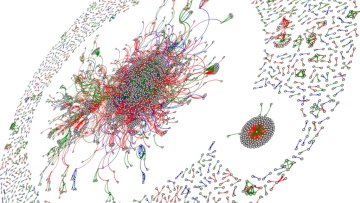For many years networks have been a fruitful source of study for mathematicians, one of the first notable examples of network analysis being Leonard Euler's study of paths on the Königsberg bridges. Since that time the field of graph theory and network science has developed greatly and the problems we want to model have also changed.
Trees, Lattices and Superrigidity
Abstract
If $G$ is an irreducible lattice in a semisimple Lie group, every action of $G$ on a tree has a global fixed point. I will give an elementary discussion of Y. Shalom's proof of this result, focussing on the case of $SL_2(\mathbb{R}) \times SL_2(\mathbb{R})$. Emphasis will be placed on the geometric aspects of the proof and on the importance of reduced cohomology, while other representation theoretic/functional analytic tools will be relegated to a couple of black boxes.
Penrose Tilings: a light introduction
Abstract
This talk will hopefully highlight the general framework in which Penrose tilings are proved to be aperiodic and in fact a tiling.
Game, Set and Bound!
Abstract
In the game 'Set', players compete to pick out groups of three cards sharing common attributes. But how many cards must be dealt before such a group must appear?
This is an example of a "cap set problem", a problem in Ramsey theory: how big can a set of objects get before some form of order appears? We will translate the cap set problem into a problem of geometry over finite fields, discussing the current best upper bounds and running through an elementary proof. We will also (very) briefly discuss one or two implications of the cap set problem over F_3 to other questions in Ramsey theory and computational complexity
Error bounds for monotone schemes for parabolic Hamilton-Jacobi-Bellman equations in bounded domains
Abstract
We provide the rate of convergence of general monotone numerical schemes for parabolic Hamilton-Jacobi-Bellman equations in bounded domains with Dirichlet boundary conditions. The so-called "shaking coefficients" technique introduced by Krylov is used. This technique is based on a perturbation of the dynamics followed by a regularization step by convolution. When restricting the equation to a domain, the perturbed problem may not satisfy such a restriction, so that a special treatment near the boundary is necessary.
Oxford Mathematician Dominic Vella has won one of this year's prestigious Philip Leverhulme Prizes. The award recognises the achievement of outstanding researchers whose work has already attracted international recognition and whose future career is exceptionally promising.



